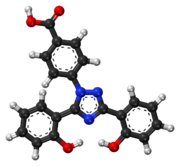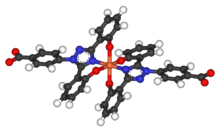This is an old revision of this page, as edited by Citation bot (talk | contribs) at 05:56, 2 November 2024 (Altered doi-broken-date. | Use this bot. Report bugs. | #UCB_CommandLine). The present address (URL) is a permanent link to this revision, which may differ significantly from the current revision.
Revision as of 05:56, 2 November 2024 by Citation bot (talk | contribs) (Altered doi-broken-date. | Use this bot. Report bugs. | #UCB_CommandLine)(diff) ← Previous revision | Latest revision (diff) | Newer revision → (diff) Oral iron chelatorPharmaceutical compound
 | |
 | |
| Clinical data | |
|---|---|
| Pronunciation | de FER a sir ox |
| Trade names | Exjade, others |
| Other names | CGP-72670, ICL-670A, IC L670 |
| AHFS/Drugs.com | Monograph |
| MedlinePlus | a606002 |
| License data |
|
| Pregnancy category |
|
| Routes of administration | By mouth |
| ATC code | |
| Legal status | |
| Legal status | |
| Pharmacokinetic data | |
| Bioavailability | 70% |
| Protein binding | 99% |
| Metabolism | Liver glucuronidation |
| Elimination half-life | 8 to 16 hours |
| Excretion | Fecal (84%) and kidney (8%) |
| Identifiers | |
IUPAC name
| |
| CAS Number | |
| PubChem CID | |
| DrugBank | |
| ChemSpider | |
| UNII | |
| KEGG | |
| ChEBI | |
| ChEMBL | |
| CompTox Dashboard (EPA) | |
| ECHA InfoCard | 100.211.077 |
| Chemical and physical data | |
| Formula | C21H15N3O4 |
| Molar mass | 373.368 g·mol |
| 3D model (JSmol) | |
| Density | 1.4±0.1 g/cm |
SMILES
| |
InChI
| |
| (what is this?) (verify) | |
Deferasirox, sold under the brand name Exjade among others, is an oral iron chelator. Its main use is to reduce chronic iron overload in patients who are receiving long-term blood transfusions for conditions such as beta-thalassemia and other chronic anemias. It is the first oral medication approved in the United States for this purpose.
It was approved by the US Food and Drug Administration (FDA) in November 2005. According to the FDA (May 2007), kidney failure and cytopenias have been reported in patients receiving deferasirox tablets for oral suspension. It is approved in the European Union by the European Medicines Agency (EMA) for children six years and older for chronic iron overload from repeated blood transfusions. It is on the World Health Organization's List of Essential Medicines.
In July 2020, Teva decided to discontinue deferasirox. It is available as a generic medication.
Properties

The half-life of deferasirox is between 8 and 16 hours allowing once a day dosing. Two molecules of deferasirox are capable of binding to 1 atom of iron which are subsequently eliminated by fecal excretion. Its low molecular weight and high lipophilicity allows the drug to be taken orally unlike deferoxamine which has to be administered by IV route (intravenous infusion). Together with deferiprone, deferasirox seems to be capable of removing iron from cells (cardiac myocytes and hepatocytes) as well as removing iron from the blood.
Synthesis
Deferasirox can be prepared from simple commercially available starting materials (salicylic acid, salicylamide and 4-hydrazinobenzoic acid) in the following two-step synthetic sequence:

The condensation of salicyloyl chloride (formed in situ from salicylic acid and thionyl chloride) with salicylamide under dehydrating reaction conditions results in formation of 2-(2-hydroxyphenyl)-1,3(4H)-benzoxazin-4-one. This intermediate is isolated and reacted with 4-hydrazinobenzoic acid in the presence of base to give 4-(3,5-bis(2-hydroxyphenyl)-1,2,4-triazol-1-yl)benzoic acid (deferasirox).
Risks
Deferasirox ranked second on the list of drugs most frequently suspected in reported patient deaths compiled for 2019, by the Institute for Safe Medical Practices, with 1320 suspected deaths. A boxed warning was added in the same year with regard to kidney failure, liver failure and gastrointestinal bleeding. It is suspected that the main driver of this spike in suspected deaths relates to the re-analysis of adverse event data by Novartis.
References
- "FDA-sourced list of all drugs with black box warnings (Use Download Full Results and View Query links.)". nctr-crs.fda.gov. FDA. Retrieved 22 October 2023.
- "Exjade EPAR". European Medicines Agency. 28 August 2006. Retrieved 21 June 2024.
- "Material Safety Data Sheet (MSDS): Deferasirox". ChemSrc. 2018.
- ^ Choudhry VP, Naithani R (August 2007). "Current status of iron overload and chelation with deferasirox". Indian Journal of Pediatrics. 74 (8): 759–64. doi:10.1007/s12098-007-0134-7. PMID 17785900. S2CID 19930076. Free full text Archived 29 April 2014 at the Wayback Machine
- Yang LP, Keam SJ, Keating GM (2007). "Deferasirox : a review of its use in the management of transfusional chronic iron overload". Drugs. 67 (15): 2211–30. doi:10.2165/00003495-200767150-00007. PMID 17927285. S2CID 195686285.
- ^ "FDA Approves First Oral Drug for Chronic Iron Overload" (Press release). United States Food and Drug Administration. 9 November 2005. Retrieved 31 October 2007.
- "Exjade – deferasirox" (PDF). European Medicines Agency. 2018. Archived from the original (PDF) on 29 December 2017. Retrieved 26 November 2012.
- Kontoghiorghes GJ (April 2013). "Turning a blind eye to deferasirox's toxicity?". Lancet. 381 (9873): 1183–4. doi:10.1016/S0140-6736(13)60799-0. PMID 23561999. S2CID 27794849.
- "Review: Exjade side effects". Archived from the original on 4 March 2016. Retrieved 20 April 2013.
- World Health Organization (2023). The selection and use of essential medicines 2023: web annex A: World Health Organization model list of essential medicines: 23rd list (2023). Geneva: World Health Organization. hdl:10665/371090. WHO/MHP/HPS/EML/2023.02.
- "Deferasirox Discontinuation". U.S. Food and Drug Administration (FDA). Retrieved 20 July 2020.
- "Drugs@FDA: FDA-Approved Drugs". U.S. Food and Drug Administration. Retrieved 15 August 2020.
- Steinhauser S, Heinz U, Bartholomä M, Weyhermüller T, Nick H, Hegetschweiler K (2004). "Complex Formation of ICL670 and Related Ligands with Fe and Fe". European Journal of Inorganic Chemistry. 2004 (21): 4177–4192. doi:10.1002/ejic.200400363.]
- ^ "QuarterWatch™ (Quarter 4 and 2009 totals): Reported Patient Deaths Increased by 14% in 2009". Institute For Safe Medication Practices. Retrieved 28 June 2021.
- Pediatrics AA (19 February 2010). "Black box warning added to Exjade". AAP News. doi:10.1542/aapnews.20100219-1 (inactive 1 November 2024). ISSN 1073-0397. Archived from the original on 28 June 2021. Retrieved 28 June 2021.
{{cite journal}}: CS1 maint: DOI inactive as of November 2024 (link)
| Chelating agents / chelation therapy (V03AC, others) | |
|---|---|
| Copper | |
| Iron | |
| Lead | |
| Thallium | |
| Other | |
| |